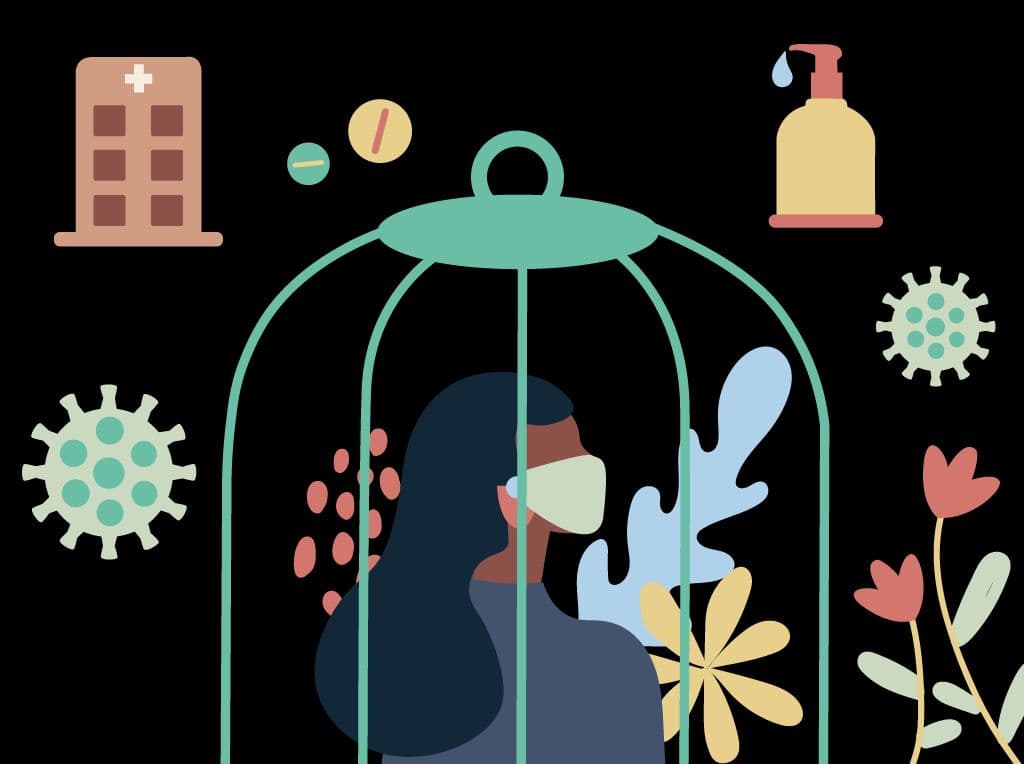The world is not fine.
There has been an outbreak which has broken one too many things and still stands upright to break even more. Some of those broken and lost are irreparable and irreplaceable. Others might take years to come back to the standing they mustered earlier.
All of us who are fortunate enough to have a home to hide ourselves in and enough food in our pantries find ourselves restless. Most of us have now been forced by situations to rethink what ‘essential’ means – turns out that the most things we have been sweating for don’t really count. And still, our heavily capitalized mindsets and the glorification of hyper-productivity have conditioned us to discover newer ways to make the ‘best’ out of this time. This is amidst the very real fact that a lot of us are struggling to survive the pandemic and trying to not die of hunger.
Nothing intensifies inequalities like a global crisis. The richer in wealth and networks will pay for a bed in the hospital and access to the best healthcare in the city if need be, while the poor would stand six feet away from each other in queues to procure ration and healthcare alike.
Health crisis also brings to the forefront the ones fighting this fight head-on – the caretakers. Doctors, nurses, sanitation workers, and the people of the gender who have conventionally been caregivers – Women.
While the physiological aspect of the virus has attacked men more aggressively than women, the socio-economic arrangement of the nature of the pandemic suggests differently.
In India, approximately 70% of nurses, midwives and community health workers are female, whose levels of exposure are “higher than doctors’,” as stated by Dr Celine Gounder, an infectious disease specialist and epidemiologist. The women also find themselves caring for those who are at higher vulnerability – the sick, senior citizens, and children. Home-makers or ‘housewives’ now find themselves sharing the little breathing space of their life with their family members and at a loss of any help, as the house-helps self isolate themselves in their respective homes.
Furthermore, amidst locked doors and curtained windows arise serious questions of women’s safety. Usha (name changed), a mother of three, puts up in a very densely populated slum in Delhi while working in a posh colony nearby. About a month ago, she happened to tell us how her husband is not only a compulsive alcoholic but also obsessively violent. Very casually, she showed us the seven marks on her body representative of the ‘slightly’ angry personality he has, quoting this as the reason why she and her children spend the afternoons roaming and working in the colony until they have no other option but to go home. A week into the lockdown, she called us to inquire if we know of any doctor or nurse who could stitch a wound caused by an aggressive husband.
This could be pushed off to the peripheries as a one-off case, but according to India’s National Commission for Women, there were 291 complaints of domestic violence via email from March 23rd to March 31st alone. To keep things in perspective, there were 302 complaints in the entire month of February and 270 in all of January ‘20, as quoted in Deccan Herald.
Even with respect to the relief operations and initiatives, there is little evidence that the needs of women were kept in mind while designing the response strategies. While multiple pregnant women in metropolitan cities have struggled to get medical attention even in critical situations owing to limited staff, the list of essential items at the beginning of the pandemic didn’t include the hygiene products like sanitary napkins in the list. Moreover, none of the national or local combat strategies claims to take precautions in ensuring the safety and privacy of women in the self-isolation facilities or shelter homes for the homeless, a question worth asking the administration.
Crises have been known to have long-lasting consequences on the gender imbalance which already exists in the workforce. During and after World War II, circumstances forced women to move out of their houses and take up the roles men left behind. However, the war with the virus is estimated to hit the marginalized gender worse than their male counterparts. In countries where the pandemic hit before India, the percentage of women who lost their jobs is significantly more than that of the men. Given the fact that three out of four women over the age of 15 neither work nor seek work in the country, the pandemic would only magnify the gender disparity in the workforce.
With a financial crisis hitting the world possibly harder than ever before in the last half a century, there would be instances when women would be forced to adhere to conventional gender roles owing to an inability to afford a lifestyle with house-help and babysitters. Moreover, given that a large chunk of women serve in the informal economy in the country, there is little hope for them being able to maintain their financial stability. Data from the times after the Great Recession indicate that women also might find themselves in a position of losing more jobs owing to the dwindling economy than men and have to try much harder to seek jobs as had been the case in the past.
While the virus has hit the world fiercely, closing it in more ways than one, it is a logical derivation that the after-effects of the pandemic would close more doors for people of other genders than men. Hence, it is worth noting that while we fight the vicious virus, the age-old fights for gender equality would always be difficult and overlapping with all other global and local crises.
ProactiveForHer is a digital clinic for women, offering accessible, personalized, and confidential health-care solutions. We offer products and services for out-patient health concerns of Indian women, across their lifetime - from puberty to pregnancy to menopause. To know more on the sexual and reproductive health of women, visit https://www.proactiveforher.com/

